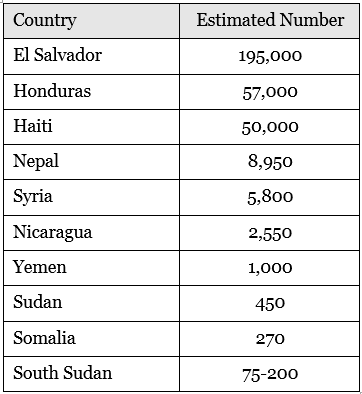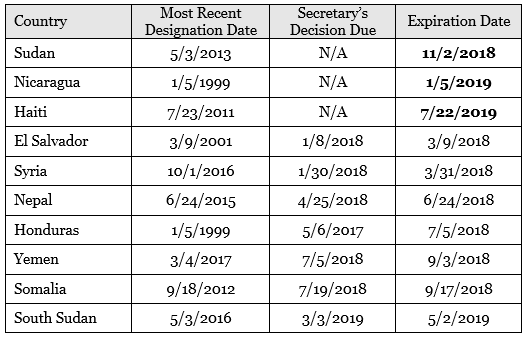News > Immigration In The United States
Time to Protect TPS
Posted on Nov 30 2017

TPS (Temporary Protected Status) and DED (Deferred Enforced Departure) are current targets of the administration’s get-tough-and-tougher immigration policy. More than 300,000 people face forced return to countries where they no longer have homes if they lose TPS or DED immigration status. The governments of several of those countries have pleaded with the U.S. government to keep TPS and DED in place, saying that their countries do not have the resources to absorb returning citizens.
TPS applies to more than 300,000 citizens of 10 countries: El Salvador, Haiti, Honduras, Nepal, Nicaragua, Somalia, Sudan, South Sudan, Syria, and Yemen. DED applies only to Liberia, and is similar to TPS.
Earthquakes, hurricanes, and civil wars can strand people outside their home countries, making it unsafe to return. TPS, established by Congress in 1990, gives people from designated countries a temporary safe haven in the United States. People with TPS receive work permission and protection from deportation.
Haitian TPS was ended by the Trump administration in November, with an 18-month delay of the effective date. Haitian TPS was granted in 2010 after a devastating earthquake. Since then, the country has endured a cholera epidemic and hurricanes. In January 2017, the State Department described conditions in Haiti:
- “…arbitrary and unlawful killings by government officials;
- use of force against suspects and protesters;
- severe overcrowding and poor sanitation in prisons;
- chronic prolonged pretrial detention;
- inefficient, unreliable, and inconsistent judiciary;
- governmental confiscation of private property without due process;
- rape, violence, and societal discrimination against women;
- child abuse;
- social marginalization of vulnerable populations;
- trafficking in persons;
- violence, including gender-based violence;
- crime within the remaining internally displaced persons (IDP) camps;
- and widespread impunity.”
Despite all evidence to the contrary, the administration insists that Haitians no longer need TPS and can safely return home. If Haitians do not qualify for TPS, who does?
The Trump administration argues that TPS is supposed to be temporary, so they are ending it. That ignores the needs of real people from countries still struggling with huge problems.
People with TPS have lived in the United States for decades. Some 88 percent participate in the labor force, a percentage higher than that for native-born Americans. About one-third have purchased homes. Collectively, Salvadoran, Honduran, and Haitian TPS holders are parents to 273,000 U.S. citizen children – who would be forced to leave their country or lose their parents if TPS is rescinded. U.S. citizen children of Salvadoran TPS holders, for example, would move to a country with one of the world’s highest murder rates and with a 62 percent rate of un- and under-employment.
Home countries rely on remittances sent by their citizens living in the United States. In Haiti, for example, remittances make up almost one-third of the country’s gross domestic product. Still reeling from hurricane after earthquake after hurricane, Haiti’s economy remains unstable, its housing inadequate, and the country both unable to welcome its citizens home and desperately dependent on the remittances that they send. Remittances make up 18 percent of the gross domestic product in Honduras, 17 percent in El Salvador, 9 percent in Nicaragua.
Instead of ending TPS, a bi-partisan group in Congress proposes a path to permanent residence. The Miami Herald quoted Rep. Yvette Clark, one of the sponsors:
“The Temporary Protected Status program was created with bipartisan support to protect human life,” said Rep. Yvette Clarke, D-N.Y., who plans to introduce the legislation with Miami Republican Rep. Ileana Ros-Lehtinen and Washington Democratic Rep. Pramila Jayapal. “It advances American interests and values and we must work in a bipartisan manner to do the right thing and protect hardworking immigrants from being sent back to countries where their physical well being could be cast into doubt.”
TPS was a temporary, band-aid solution to a real and continuing problem. Now Congress needs to act to find a permanent solution for people who have become an integral part of our economy and communities.

Alianza Americas has an action guide with numbers to call and phone scripts to use in asking Congress and the administration to protect TPS holders.




